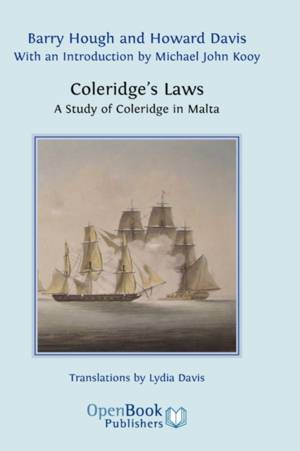
- Retrait gratuit dans votre magasin Club
- 7.000.000 titres dans notre catalogue
- Payer en toute sécurité
- Toujours un magasin près de chez vous
- Retrait gratuit dans votre magasin Club
- 7.000.0000 titres dans notre catalogue
- Payer en toute sécurité
- Toujours un magasin près de chez vous
65,45 €
+ 130 points
Format
Description
"This work will change our understanding of Coleridge's politics and how we read his oeuvre." Dr. Michael John Kooy (Warwick University, U.K.) Samuel Taylor Coleridge is best known as a great poet and literary theorist, but for one, quite short, period of his life he held real political power - acting as Public Secretary to the British Civil Commissioner in Malta in 1805. This was a formative experience for Coleridge which he later identified as being one of the most instructive in his entire life. In this volume Barry Hough and Howard Davis show how Coleridge's actions whilst in a position of power differ markedly from the idealism he had advocated before taking office - shedding new light on Coleridge's sense of political and legal morality. Meticulously researched and including newly discovered archival materials, Coleridge's Laws provides detailed analysis of the laws and public notices drafted by Coleridge, together with the first published translations of them. Drawing from a wealth of primary sources Hough and Davis identify the political challenges facing Coleridge and reveal that, in attempting to win over the Maltese public to support Britain's strategic interests, Coleridge was complicit in acts of government which were both inconsistent with the the rule of law and contrary to his professed beliefs. Coleridge's willingness to overlook accepted legal processes and personal misgivings for political expediency is disturbing and, as explained by Michael John Kooy's in his extensive Introduction, necessarily alters our understanding of the author and his writing. Coleridge's Laws contributes in new ways to the current debates about Coleridge's achievements, British colonialism and its engagement with the rule of law, nationhood and the effectiveness of the British administration of Malta. It provides essential reading for anybody interested in Coleridge specifically and the Romantics more generally, for political and legal historians and for students of colonial government.
Spécifications
Parties prenantes
- Auteur(s) :
- Editeur:
Contenu
- Nombre de pages :
- 406
- Langue:
- Anglais
Caractéristiques
- EAN:
- 9781906924133
- Date de parution :
- 01-01-10
- Format:
- Livre relié
- Format numérique:
- Genaaid
- Dimensions :
- 156 mm x 234 mm
- Poids :
- 743 g

Les avis
Nous publions uniquement les avis qui respectent les conditions requises. Consultez nos conditions pour les avis.






